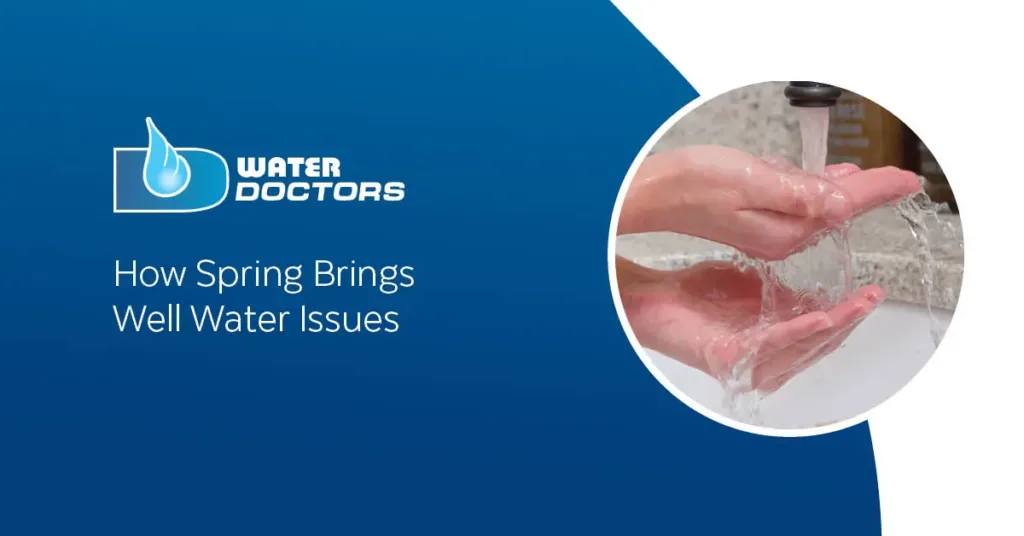Every year during spring and fall, we get a surge of questions about water quality from homeowners that use well water. As the seasons change, well water users notice that their water supply just seems… off. They don’t know why or how, but their water doesn’t taste or smell the same as it did just a few months ago. What’s causing these well water issues? As it turns out, everything you put on your lawn to keep it healthy and looking great makes it into your well water supply, bringing along funky flavors and odors, but Water Doctors can help.
How do weird tastes and smells get into your well water?
It’s key to understand that soil is very permeable. That means that any liquids or soluble solids that get sprayed, spread, sprinkled, or spritzed on it can pass through easily. That’s good news for plants like your grass, as it helps water and nutrients get into their root systems. However, it also means that anything that’s in the water can also travel freely through the soil, including impurities. And what’s in the ground is what’s in your well water.
A very common offender for seasonal well water issues is fertilizer. It’s great for grass! But as your fertilizer seeps into the ground, it also seeps into the groundwater and your water supply. Trace amounts of the minerals and nutrients that make your grass greener can build up in the soil over time, pushing their way into your water and bringing funky odors and flavors. The same is true of insecticides, weed killers, and other lawn care products.
That’s not to mention any substances that get carried into the water supply through runoff. Particularly if your property is at a lower elevation than the surrounding area, rainfall can carry all sorts of unwanted contaminants into your groundwater or even the well itself.
In addition to the products you put on your lawn and runoff, the minerals that are naturally present in your soil can find their way into your water, too. Melting snow and spring showers push through soil layers, picking up minerals and impurities along the way. The destination: Your home’s well water supply.
Many homeowners are under the impression that the layers of soil, sand, and rock that are found in the groundwork as a natural filter. While these layers help keep out large debris, this isn’t a failsafe system. It won’t adequately protect you from every kind of pollutant, and it certainly won’t prevent soluble minerals and compounds from building up in your well water.
What kinds of impurities are present?
Fertilizer contains some combination of nitrogen, phosphorous, and potassium (potash), along with filler materials that help these nutrients spread more evenly. These components, or versions of them, can get into your water. Nitrates and chloride (found in potash) are particularly concerning, especially for the quality and healthfulness of your drinking water.
Other sources of impurities bring other types of impurities. Herbicides contain atrazine or glyphosate, which have both been linked to damaging health effects. A variety of compounds that are common in pesticides have also been linked to long-term health problems related to chronic low-level toxicity. Stormwater runoff carries anything that might be on the surface of your road, driveway, or lawn, including oil, sidewalk salt, gasoline, and animal waste. And one of the most common impurities that melting snow carries is iron, which can be easily detectable from the rust stains on your appliances and fixtures.
We don’t say all of this to scare you! Many of the minerals that can be found in water are part of a normal human diet in small, controlled amounts. However, it can be easy for your well water to carry levels of these impurities that are too high to be healthy. Plus, any unwanted substance in your water can change the smell or flavor in unpleasant ways that well owners are often very familiar with.
What can you do to get cleaner well water again?
First, be smart about the substances you put on your lawn and how you apply them. Consider using lawn products made of organic or natural ingredients if chemicals are a concern. For example, vinegar is a natural herbicide that can be sprayed on unwanted weeds and plant growth. Closely follow the directions for whatever product you choose and take care not to use too much–that’s not doing any favors to your lawn or your water. Mix, dilute, store, and dispose of products far away from your well. Avoid applying anything just before heavy rainfall, as this will increase runoff and waste.
Regarding runoff, make sure that your well casing extends above the ground by at least one foot so debris and contaminants can’t flow directly into the well itself. If you notice that stormwater flows toward your well or pools in the surrounding areas, try re-grading and landscaping to get things flowing in the right direction.
Even with ideal application, some impurities from seasonal lawn products will still get into your well water supply, bringing tell-tale odors and flavors. Plus, there’s not much you can do to prevent natural soil minerals like iron from contaminating your water. It’s important to get your well water tested and to counteract these impurities with a high-quality filtration system. Water Doctors offers top-rated Kinetico products that make your home’s drinking water cleaner and more delicious again. Schedule a free water test today!
Visit our partner 4D Water Well & Pump for your arsenic, bacteria, and nitrate testing needs, along with inspection and maintenance.
